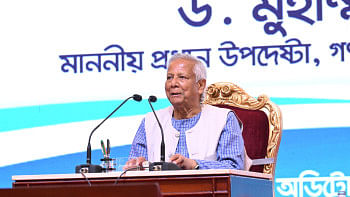China analysing if any country in “debt trap”: Ambassador Zuo
China is analysing if any country is in a “debt trap” due to loans for mega infrastructure projects under its Belt and Road Initiative (BRI), Chinese Ambassador to Bangladesh Zhang Zuo said yesterday.
“China is analysing the debt crisis,” Zhang Zuo said at a press conference organised at The Westin to inform on the Second Belt and Road Forum for International Cooperation held in China on April 25-27 this year.
China has pledged a green and sustainable development model as the country moves forward with the BRI initiative, an ambitious infrastructure and investment strategy initiated by Chinese President Xi Jinping in 2013.
The initiative aims to strengthen infrastructure, trade and investment links between China and some 65 countries. It aims to connect China to central, south and south-east Asia, the Gulf countries, Europe and North Africa.
Bangladesh is a partner in this initiative. BRI has been the subject of controversy in the West, particularly Washington, which views it as merely a means to widen Chinese influence abroad and “trap countries into debt” through “non-transparent” projects.
India also opted against joining the BRI, citing concerns over China’s projects with Pakistan.
Some analysts say India is “not comfortable” with Bangladesh joining the initiative either.
ADB President Takehiko Nakao last week advised countries to carefully evaluate the merits of a project before approaching China for funding under BRI.
“I believe the major players of BRI, the companies involved, can provide better assessment whether BRI is a debt trap or not,” Zhang Zuo told reporters at yesterday’s event.
According to the diplomat, China has provided around USD 6 billion under government-to-government agreements for 11 projects, including the Padma Bridge and Karnaphuli Tunnel, under BRI. The interest rate is 2-3 percent.
China promotes high quality Belt and Road cooperation based on principles of extensive consultation, joint contribution and shared benefits -- pursuing a transparent process, Zhang Zuo said.
He added that China “sticks to high standards, people-centred and sustainable development.
“These concepts were included in the joint communique in the Belt and Road Forum,” he said.
He assured that China is fully aware of the environmental concerns while implementing the BRI and that such concerns will be fully addressed in the process.
Asked about the Rohingya crisis, the Chinese ambassador said BCIM (a regional forum on trade and infrastructure involving Bangladesh, China, India and Myanmar) could help resolve the Rohingya crisis.
The Chinese envoy said China and Myanmar signed a document on the construction of economic corridor which is a very important part of the BCIM.
“I believe real solution lies on development [in Myanmar],” he said.
The ambassador said China was working to that end to solve the problem of poverty in Myanmar.
China is willing to continue to play an important role in this regard, the Chinese ambassador said.
“We hope Bangladesh and Myanmar will keep continuing the dialogue with each other for repatriation of Rohingyas as soon as possible,” he added.
At yesterday’s press conference, Centre for Policy Dialogue (CPD) Executive Director Dr Fahmida Khatun, Bangladesh Enterprise Institute President Farooq Sobhan and Bangladesh Institute of Peace and Security Studies President Major General (retd) ANM Muniruzzaman were also present.

 For all latest news, follow The Daily Star's Google News channel.
For all latest news, follow The Daily Star's Google News channel. 



Comments